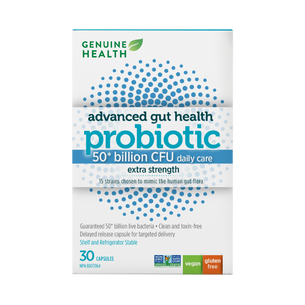How a Woman’s Microbiome Changes During Pregnancy

I’m always talking about the microbiome. I’m obsessed with it. I’ve talked about the adult microbiome, and how it’s connected to the brain, how it can impact food sensitivities, and more. But today I want to talk about the microbiome during pregnancy—and the effect that it can have on having a healthy baby (while also protecting mom).
Over the course of the 9 months of pregnancy, a shift will occur in mom’s microbiome. Here’s what happens:
When mom’s pregnant, she’s producing more estrogen and progesterone than normal—which have an impact on the microbiome, particularly on gut motility. When gut motility slows down, we see things like constipation and acid reflux.
The question is… why would the body want to slow things down? Why would the body actually want to induce acid reflux or constipation? The theory is the slower motility gives the body more of an opportunity to harvest energy from the food mom is eating.
As the pregnancy progresses into the second trimester, you’ll start to see more changes to the gut bacteria, and the microbiome will look different from the way it did before.
The microbiome will have more inflammatory bacteria, and will start to resemble the gut microbiome of someone with metabolic syndrome. (What I’m talking about when I say ‘metabolic syndrome’ is typically someone with obesity and type II diabetes.)
Yes, even in someone who was skinny before pregnancy, pregnancy will cause the gut microbiome to resemble someone who is obese, with type II diabetes! And there is a significant effect of this change.
You can give mom the exact same meal that she tolerated well before pregnancy. Now that she’s pregnant and her gut microbiome is making this change, you will see:
Why would we care about these changes? Are there any consequences to these changes? The answer is yes. These changes do have an effect on mom and for baby.
When we’re talking about mom, the amount of weight that she gains is by some degree determined by the makeup of the gut microbiome and these changes that are occurring. You also see the risk for gestational diabetes is related to these changes in the microbiome.
Talking about the size of the baby, whether the baby is high or low birth weight, depends on this, too! And believe it or not, there are studies that suggest that pre-term labor is even associated with changes to the microbiome.
Knowing all this, our goal is to optimize mom’s microbiome. By doing this, we’re doing two things: we’re protecting mom and we’re protecting baby.
First, it’s clear we want to avoid damage to the microbiome from stress, infections and antibiotics.
If mom must take antibiotics while pregnant, we need to be very cautious and make sure that it’s absolutely necessary for us to be using them. This is because we know that just a few days of antibiotics can cause significant changes to the gut microbiome, and that could potentially have an effect on pregnancy. (Keep in mind that antibiotics won’t necessarily cause a profound effect, but they could have an effect.)
The flip side of that equation is that we want to do everything we can to foster a healthy microbiome in mom. Believe it or not, the food mom eats even before she becomes pregnant has an effect on her gut microbiome during pregnancy.
It’s important for mom to eat well BEFORE pregnancy and it’s important for mom to eat well DURING pregnancy, too.
I recommend maximizing diversity of fruits, vegetables, whole grains, seeds and nuts. A diversity of plants during pregnancy so mom can get all the benefits from all the polyphenols, vitamins, minerals, fibre, and other phytochemicals—there’s a lot of nutritional value there!
But there are a lot of other things we can do to help!
We know from studies that probiotics provide benefit to mom during pregnancy. Specifically, what we’re talking about is protecting mom from gestational diabetes, and from pre-eclampsia, which are concerning during pregnancy.
What we need is a mix of lactobacillus and bifidobacteria. These are two of the different families of bacteria that you want included in your probiotic.
And guess what? You can find all those things in Genuine Health’s advanced gut health probiotic women’s daily, or advanced gut health probiotic 50 billion.
Both probiotics have 15 different strains, of which are lactobacillus and bifidobacteria.
advanced gut health probiotics are encapsulated in a delayed-release capsule, which is designed to get from your mouth, past your stomach acid, and to your colon, where you actually want to deliver the bacteria.
These probiotics also include hearty strains that are triple-cleaned. Basically this means that they’ve cleaned up the bacteria and they’re picking out the strong ones to include in each capsule.
In closing, taking probiotics before and during pregnancy is something that you should talk to your OB-GYN about—but considering the impact that the gut microbiome has on a healthy pregnancy, I would consider taking a probiotic like advanced gut health probiotic daily.
Over the course of the 9 months of pregnancy, a shift will occur in mom’s microbiome. Here’s what happens:
What Happens in the First Trimester
When mom’s pregnant, she’s producing more estrogen and progesterone than normal—which have an impact on the microbiome, particularly on gut motility. When gut motility slows down, we see things like constipation and acid reflux.
The question is… why would the body want to slow things down? Why would the body actually want to induce acid reflux or constipation? The theory is the slower motility gives the body more of an opportunity to harvest energy from the food mom is eating.
What Happens in the Second & Third Trimester
As the pregnancy progresses into the second trimester, you’ll start to see more changes to the gut bacteria, and the microbiome will look different from the way it did before.
The microbiome will have more inflammatory bacteria, and will start to resemble the gut microbiome of someone with metabolic syndrome. (What I’m talking about when I say ‘metabolic syndrome’ is typically someone with obesity and type II diabetes.)
Yes, even in someone who was skinny before pregnancy, pregnancy will cause the gut microbiome to resemble someone who is obese, with type II diabetes! And there is a significant effect of this change.
You can give mom the exact same meal that she tolerated well before pregnancy. Now that she’s pregnant and her gut microbiome is making this change, you will see:
- Increased release of insulin
- Increased insulin resistance
- Increased cholesterol
- Changes in hormones
- Increased fat deposition
Why would we care about these changes? Are there any consequences to these changes? The answer is yes. These changes do have an effect on mom and for baby.
When we’re talking about mom, the amount of weight that she gains is by some degree determined by the makeup of the gut microbiome and these changes that are occurring. You also see the risk for gestational diabetes is related to these changes in the microbiome.
Talking about the size of the baby, whether the baby is high or low birth weight, depends on this, too! And believe it or not, there are studies that suggest that pre-term labor is even associated with changes to the microbiome.
Knowing all this, our goal is to optimize mom’s microbiome. By doing this, we’re doing two things: we’re protecting mom and we’re protecting baby.
First, it’s clear we want to avoid damage to the microbiome from stress, infections and antibiotics.
If mom must take antibiotics while pregnant, we need to be very cautious and make sure that it’s absolutely necessary for us to be using them. This is because we know that just a few days of antibiotics can cause significant changes to the gut microbiome, and that could potentially have an effect on pregnancy. (Keep in mind that antibiotics won’t necessarily cause a profound effect, but they could have an effect.)
The flip side of that equation is that we want to do everything we can to foster a healthy microbiome in mom. Believe it or not, the food mom eats even before she becomes pregnant has an effect on her gut microbiome during pregnancy.
It’s important for mom to eat well BEFORE pregnancy and it’s important for mom to eat well DURING pregnancy, too.
I recommend maximizing diversity of fruits, vegetables, whole grains, seeds and nuts. A diversity of plants during pregnancy so mom can get all the benefits from all the polyphenols, vitamins, minerals, fibre, and other phytochemicals—there’s a lot of nutritional value there!
But there are a lot of other things we can do to help!
We know from studies that probiotics provide benefit to mom during pregnancy. Specifically, what we’re talking about is protecting mom from gestational diabetes, and from pre-eclampsia, which are concerning during pregnancy.
What we need is a mix of lactobacillus and bifidobacteria. These are two of the different families of bacteria that you want included in your probiotic.
And guess what? You can find all those things in Genuine Health’s advanced gut health probiotic women’s daily, or advanced gut health probiotic 50 billion.
Both probiotics have 15 different strains, of which are lactobacillus and bifidobacteria.
advanced gut health probiotics are encapsulated in a delayed-release capsule, which is designed to get from your mouth, past your stomach acid, and to your colon, where you actually want to deliver the bacteria.
These probiotics also include hearty strains that are triple-cleaned. Basically this means that they’ve cleaned up the bacteria and they’re picking out the strong ones to include in each capsule.
In closing, taking probiotics before and during pregnancy is something that you should talk to your OB-GYN about—but considering the impact that the gut microbiome has on a healthy pregnancy, I would consider taking a probiotic like advanced gut health probiotic daily.



















































